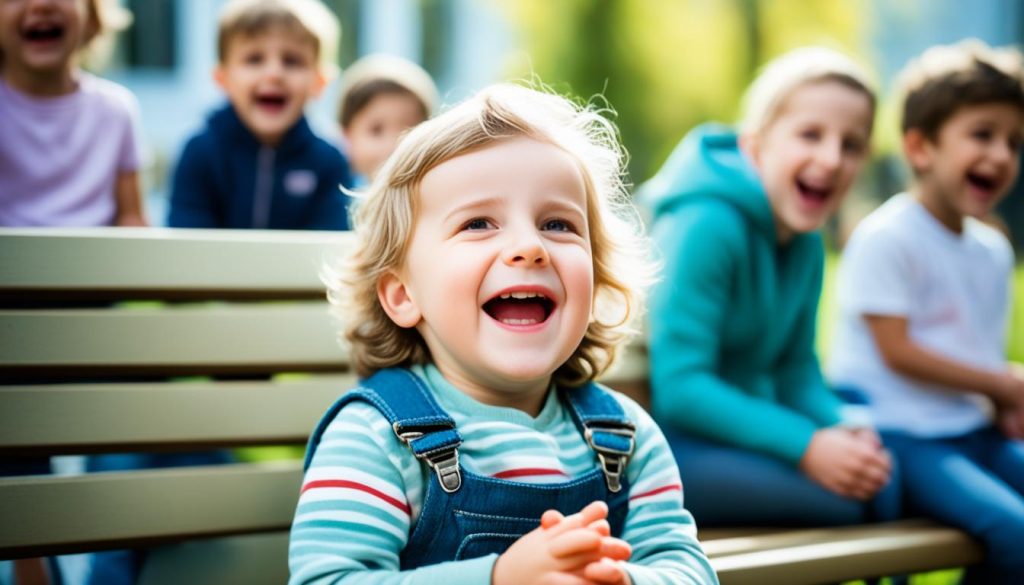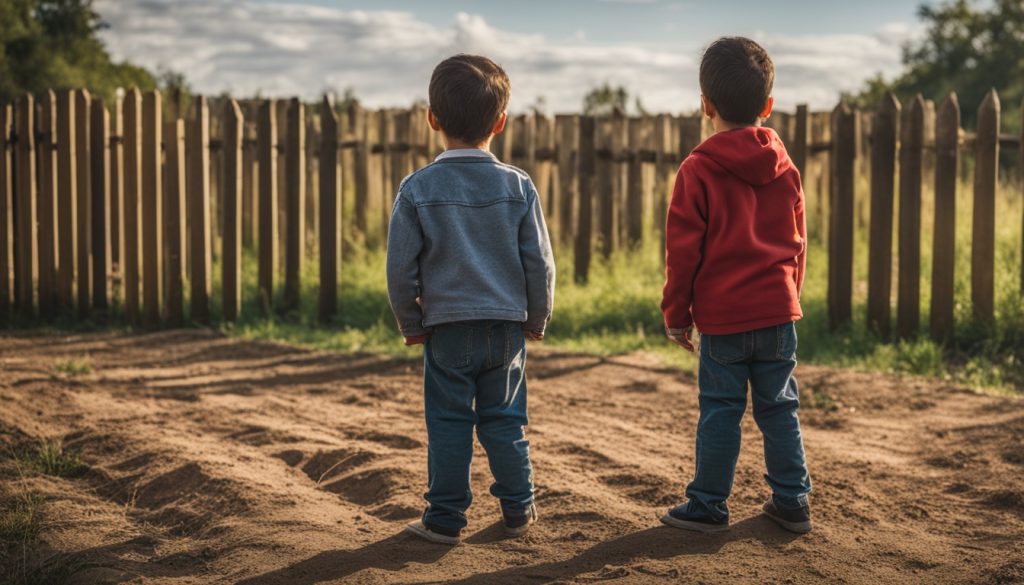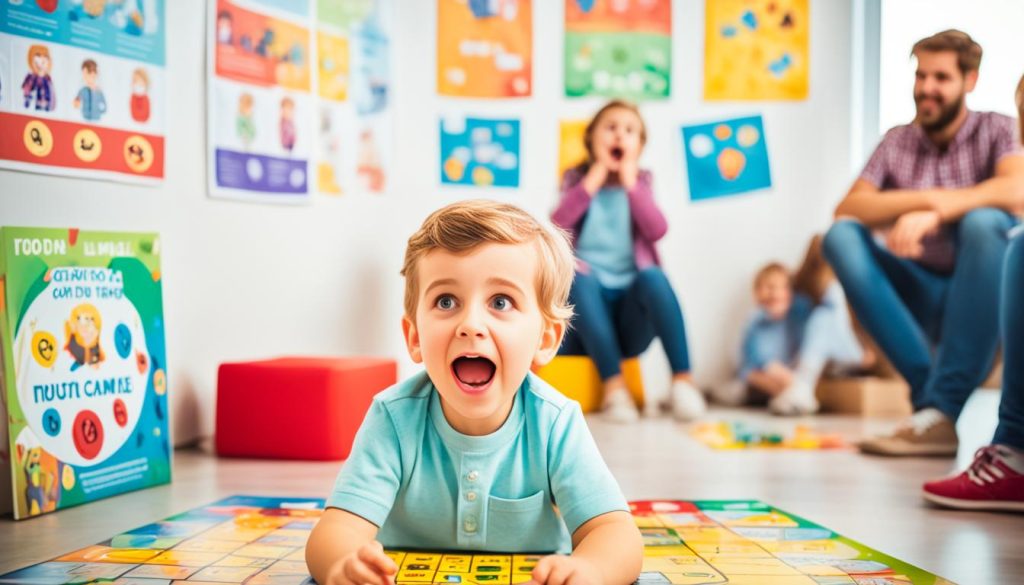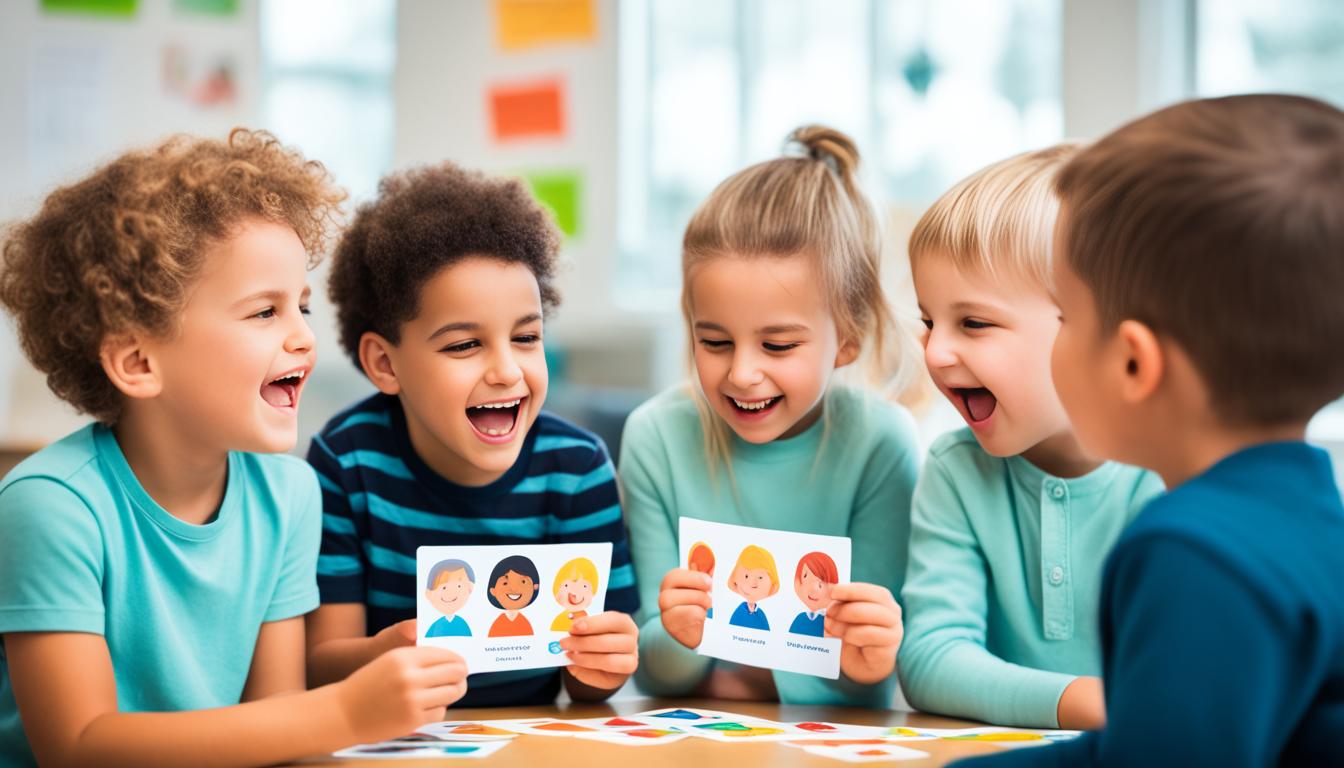Have you seen your child comfort a friend or share a toy without being asked? These acts show empathy, a key skill for good relationships and success. As parents, we want our kids to be kind and understand others’ feelings. In today’s world, teaching empathy is more important than ever.
Empathy is key to emotional smarts, helping kids handle their feelings and get others’. Positive parenting, like showing empathy and talking openly with your child, helps build emotional smarts. Knowing how important empathy is and using the right strategies can really help kids socially, mentally, and emotionally.
So, how can you help your kids be more empathetic and aware of their feelings? It’s not just about teaching right from wrong. You need to create a safe space, support them, and praise their emotional efforts. Activities like the 21-Day Family Gratitude Challenge can make your kids more empathetic and aware of their feelings.
Key Takeaways
- Empathy is key for good relationships and success.
- Parents are crucial in teaching kids emotional smarts.
- Creating a safe space helps kids develop empathy.
- Getting kids involved in helping boosts kindness and empathy.
- Regular talking with your child helps with emotional awareness.
Understanding Empathy and Emotional Awareness
Empathy and emotional awareness are key in a child’s emotional growth. They help kids handle social situations better. They also play a big part in teaching kids to be responsible and boosting their self-esteem.
Definition of Empathy
Empathy means understanding and feeling what others feel. It makes kids better at social interactions. It helps them stand up to peer pressure and build strong friendships.
Importance of Emotional Awareness
Knowing your own and others’ feelings is crucial for empathy. Kids who are good at this are less likely to act aggressively or bully others. They find it easier to talk and connect with people.

Developmental Milestones in Empathy
There are several milestones that help a child develop empathy:
- Secure Parent-Child Relationships: These build trust and safety, letting kids explore emotions.
- Social Referencing: Kids learn how to react to emotions by watching adults.
- Theory of Mind Development: This is when kids understand others have their own thoughts and feelings.
- Self-Recognition: Seeing themselves in a mirror helps kids understand they are unique.
- Understanding of Self: As kids get older, they feel more like individuals. This helps them empathize with others.
These milestones are key in teaching kids responsibility and boosting their self-esteem. Talking about feelings, telling stories, or doing volunteer work are great ways to help kids grow in empathy and emotional awareness.
The Role of Positive Parenting in Building Empathy
Using Positive Reinforcement Parenting helps grow empathy in kids. It means showing empathy, making a safe space, and talking often with your child. These steps are key to helping your child feel and understand others’ feelings.

Modeling Empathy as a Parent
Positive Reinforcement Parenting means setting a good example. Show empathy in how you talk and act, and your kids will learn from you. This way, they grow up respecting others and feeling for them.
For example, saying “I see you’re sad” helps kids understand and value emotions. Teaching them to be thankful and empathetic makes them kinder and more respectful.
Creating an Emotionally Safe Environment
It’s important to make a safe space for your child to share feelings. This means they can talk about their emotions without fear. Such a space helps manage screen time and encourages real-life interactions.
By accepting their feelings, you show them all emotions are okay. This helps them understand themselves and others better.
The Impact of Parent-Child Communication on Empathy Development
Talking well with your child helps them feel and understand others. Positive parenting methods like listening and responding well build empathy. It also teaches kids about gratitude and respect.
Studies show kids with positive parenting do better in school and with friends. They’re more emotionally smart and well-adjusted.
| Statistic | Impact |
|---|---|
| Children with high emotional intelligence | Less defiant, mentally healthier, and more successful academically and relationally |
| Emotional coaching programs | 79% improvement in children’s positive behaviors and well-being |
| Positive parenting | More positive school adjustment and fewer behavior problems by sixth grade |
Age-Specific Strategies for Teaching Empathy
Empathy grows differently at each childhood stage. It’s key to use strategies that match each age to help it grow. By knowing how children of different ages develop empathy, you can use the right methods to help them.
Strategies for Toddlers and Preschoolers
For toddlers and preschoolers, teaching empathy is simple in everyday moments. Kids this age, from 18 to 24 months, start to understand others’ thoughts and see themselves in mirrors. Here are ways to help them develop empathy:
- Modeling Empathetic Behavior: Show empathy yourself to teach kids by example. For example, comforting a crying child shows them what empathy is.
- Emotional Labeling: Pictures of feelings help kids recognize and name emotions. This is key for empathy.
- Story-Based Discussions: Reading books that talk about feelings helps kids understand and connect with others’ emotions.
Strategies for Early Elementary Kids
Kids aged 5-7 can do more to improve their empathy. Setting clear boundaries helps them see empathy doesn’t mean giving up their own needs. Here are some strategies:
- Emotion Charades: Playing charades with emotions helps kids recognize and share feelings. It’s vital for social skills.
- Open Discussions: Talking about feelings openly makes kids more aware and empathetic. It also teaches empathy through conversation.
-

Helping Behavior: Encouraging kids to help at home or in the community builds kindness and empathy towards others.
Strategies for Tweens and Teens
Tweens and teens need empathy exercises that are more complex. They can understand complex feelings and views. Here are some effective strategies:
- Diverse Perspective Discussions: Talking about different backgrounds and abilities helps teens understand and empathize with a variety of people.
- Setting Boundaries: Teaching teens about healthy boundaries helps them see empathy as respecting others’ feelings and their own.
- Observation Exercises: Asking teens to notice nonverbal cues in social situations deepens their emotional understanding. This helps with empathy and discipline.
Interactive Games and Activities to Encourage Emotional Awareness
Playing interactive games and doing activities is key for kids to grow and be creative. These activities help kids understand and share their feelings in a good way. We’ll look at ways families and teachers can help kids learn these important skills.
Emotion Charades
Emotion Charades is a great game for kids to learn about feelings and be creative. Players act out emotions and others try to guess them. This game helps kids get better at recognizing and showing feelings without words.
Role-Playing Scenarios
Role-playing lets kids practice being empathetic and handling emotions. By taking on different roles, they learn how to deal with social situations. This helps them become more creative and socially skilled.
Using Picture Books to Discuss Feelings
Picture books are great for talking about feelings with kids. They show kids different emotions through stories. Books like “Inside Out” and “Finding Nemo” are good for teaching kids about feelings and empathy.

These games and activities are important for kids’ emotional growth. They help kids learn and grow, as seen in Bandura’s social learning theory and Bowlby’s attachment theory. Here’s a table showing how different activities help kids with their feelings:
| Activity | Benefit | Development Focus |
|---|---|---|
| Emotion Charades | Recognizing and expressing emotions | Emotional awareness |
| Role-Playing Scenarios | Handling social situations | Empathy and social skills |
| Picture Books | Discussing complex emotions | Emotional literacy |
| Community Gardening | Responsibility, nurturing | Social competence |
| Token Stack Activities | Considerate conversations | Communication skills |
| Improvisational Stories | Collaborative storytelling | Creativity, teamwork |
Adding these fun activities to your child’s daily life can really help with their creativity and feelings. Each activity is a great way to improve a child’s emotional and social skills.
Using Praise and Positive Reinforcement
Praise and positive reinforcement are key to encouraging empathy in children. By focusing on and celebrating empathy, you create a positive space. Here are some ways to use Positive Reinforcement Parenting effectively.
Specific Examples of Praising Empathy
Specific praise helps build resilience in kids. Instead of just saying “good job,” point out specific actions that show empathy. For example, you might say, “I appreciate how you shared your toys with your sibling; that was very kind of you.” This kind of praise shows kids the value of their actions.
Positive reinforcement leaves a lasting impact. Regularly noticing empathetic actions makes empathy a part of your child’s behavior. Research by Barbara Fredrickson suggests a 5 to 1 ratio of positive to negative reinforcement. This can make your home happier and more cooperative.
Building a Habit of Recognizing Emotional Efforts
Praising and recognizing emotional efforts helps kids become more independent. Using a reward system, like sticker charts for young kids or tokens for older ones, encourages good behavior. These systems give immediate rewards and help change behavior for the long term.
Also, praising efforts to manage tough emotions reassures and validates kids. Saying something like, “I noticed you took deep breaths when you were upset, and it really helped calm you down. Great job!” shows kids their emotional efforts are important and work.
Being consistent with Positive Reinforcement Parenting helps reinforce good behaviors and creates a peaceful family. Mixing praise with surprises keeps kids motivated to keep up their good behavior.
- Use specific praise: Highlight the exact empathetic action.
- Maintain a 5:1 ratio: Aim for five praises for every correction.
- Implement reward systems: Sticker charts or tokens for immediate rewards.
- Validate emotional efforts: Acknowledge and praise their attempts to manage emotions.
- Mix up rewards: Keep children excited with unexpected positive reinforcements.
The Impact of Helping Behavior on Empathy Development
Helping kids help others is a great way to grow empathy. When families volunteer together, they learn about responsibility and independence. This also helps siblings get along better.
Opportunities to Volunteer as a Family
Volunteering lets kids see the value of kindness and community. It’s a hands-on way to teach them about responsibility. They get to see how people work together and show compassion.
49 out of 80 parents remember their kids started helping early, in the second year. 31 parents recall it in the first year. And 14 parents talk about helping before eight months.
These experiences teach kids about giving and understanding different situations. By helping out in local cleanups or food drives, they learn the value of helping others. This helps them become more independent.
Engaging in Community Service Projects
Community projects are great for teaching empathy and helping siblings get along. Working together, siblings learn to support and cooperate. This can make their relationship better.
More than half (50 out of 100) of 19-month-olds gave a snack to a stranger, even if they were hungry. This shows early empathy.
Getting kids involved in these projects helps them see the impact of their actions. Whether it’s organizing a charity event or helping with habitat restoration, these activities teach independence and responsibility. They do this in a supportive setting.
| Age | Helping Behavior | Common Activities |
|---|---|---|
| 1-2 years | Simple tasks like handing over items | Participating in toy drives |
| 3-5 years | More complex tasks requiring following instructions | Food bank visits, park clean-ups |
| 6-10 years | Independent initiative in helping | Community gardening, charity run |
Starting kids in helping early uses their natural empathy. It lays a strong foundation for caring behaviors throughout their lives.
Handling Difficult Emotions Effectively
It’s important for kids to understand and manage tough feelings. Parents can help by accepting their emotions, teaching them to express feelings well, and helping them feel for others. This helps kids grow emotionally and become more empathetic.
Validating Children’s Emotions
When we validate kids, they feel seen and heard. This is key in managing child tantrums and making them feel secure. For kids under 3, it’s important to name their feelings. Kids aged 3-8 can then use play to practice these skills.
Teaching Healthy Emotional Expression
Teaching kids to express feelings in a healthy way changes their lives. Strategies like counting to 10 or deep breathing help calm them down. These methods are great for pre-teens and teens, who often face strong emotions as their brains develop.
Encouraging kids to talk about their feelings instead of acting out can also help. This reduces outbursts and impulsive actions.
Guiding Children Through Empathy-Building Reflection
Reflecting on feelings and others’ feelings builds empathy. Parents can help kids talk about their feelings and how they impact others. This reflection helps kids recover from strong emotions and act kindly.
Also, developing healthy habits in kids, like good sleep and eating, supports emotional control and empathy. Making sure kids sleep well and eat right is key to handling their feelings.
Encouraging Empathy through Storytelling and Books
Storytelling and books are great for teaching kids empathy. They open young minds to new perspectives and experiences. This helps strengthen the bond between parents and children. These stories also fit different ways kids learn and teach them about diversity.
Recommended Books for Different Age Groups
It’s important to pick books that match your child’s age. For little ones, try “Circles of Hope” and “Running the Road to ABC”. They talk about empathy and understanding natural disasters. Kids aged 5-7 might like “The Invisible Boy” by Trudy Ludwig.
For 8-10 year olds, “Wonder” by R.J. Palacio is a good choice. Teenagers can dive deeper with “The Giver” by Lois Lowry. These books offer insights into empathy and social issues.
Discussion Questions to Enhance Empathy
When reading, ask questions like, “How do you think the character felt?” or “What would you do if you were them?”. Talking about these questions helps strengthen the bond between parents and kids. It also teaches kids about diversity and makes them think deeply about feelings and actions.
Activities to Complement Storytelling
- Role-playing scenarios: Act out scenes from the book to help children understand and express different emotions.
- Drawing and art: Encourage your child to draw scenes or characters from the book that touched them, deepening their emotional connection.
- Writing letters: Have your child write letters from one character to another, improving their ability to see things from another’s point of view.
Getting kids involved in activities related to stories helps them understand better. It supports their emotional and social growth. These activities boost empathy and fit different learning styles. By using stories, parents and teachers can make a big difference in teaching kids about diversity and strengthening family bonds.
| Resource | Age Group | Empathy Focus |
|---|---|---|
| “Circles of Hope” & “Running the Road to ABC” | Preschoolers | Understanding diversity and natural disasters |
| “The Invisible Boy” | 5-7 years | Inclusion and kindness |
| “Wonder” | 8-10 years | Empathy for those with differences |
| “The Giver” | Tweens and Teens | Societal empathy and moral dilemmas |
The Connection Between Emotional Intelligence and Social Skills
Understanding how emotional intelligence (EI) and social skills are linked is key for kids. Parents start teaching this from the beginning. This early start is crucial for kids to learn social skills, which helps them in kindergarten and later life.
Developing Social Awareness through Empathy
Empathy is key to social awareness in kids. They learn by watching and copying adults. Talking about feelings and encouraging kids to express theirs helps grow empathy.
A supportive environment is crucial. It helps kids feel heard and respected. This boosts their empathy and social awareness.
Building Stronger Peer Relationships
Empathy helps kids make strong friendships. By understanding others’ feelings, they do better in social situations. This emotional connection is key for learning and growing with others.
Studies show that kids who learn about emotions from parents do better in school and life. This includes handling tough times like their parents getting divorced.
Impact on Academic and Life Success
Emotional intelligence helps kids do well in school and life. They’re good at talking, working with others, and solving problems. These skills are vital for school and future careers.
Teaching kids about emotional intelligence helps them grow and learn throughout life. It’s a key part of their education.
Teaching kids about emotional intelligence and social skills is very important. Research shows that even two-year-olds start to understand others’ feelings. A safe, supportive place helps kids handle their feelings well.
For more tips on supporting your child’s mental health, check out this resource.
The Benefits of Outdoor Play in Developing Empathy
Outdoor play is key in teaching kids empathy. It lets them connect with nature and enjoy free play. This helps their health and learning.
Connection with Nature
Being outside helps kids feel close to nature. This closeness makes them care more for the environment and its creatures. 87% of people who played outside as kids still love nature as adults. This bond helps kids be more empathetic.
Unstructured Playtime Opportunities
Free play is important for kids’ growth. It boosts creativity and problem-solving skills. Kids who play outside more are nicer to others and less likely to bully.
Outdoor play also makes kids stronger and more coordinated. This is good for their health and learning.
| Aspect | Benefits |
|---|---|
| Connection with Nature | Fosters empathy towards the environment and living beings |
| Unstructured Playtime | Enhances creativity, social skills, and cooperative play |
| Physical Health | Boosts muscle strength, coordination, and immune system |
Kids need at least 40 minutes of outdoor play daily to gain these benefits. But, indoor living and tech have cut down on outdoor time. We must find ways to keep kids active and empathetic.
Conclusion
Teaching kids about empathy and emotional awareness is key to their growth. It needs a mix of the right teaching methods, positive parenting, and a supportive environment. By strengthening the parent-child bond and balancing work and family, parents help their kids grow emotionally.
Studies show how crucial these efforts are. Most parents, about 85%, believe in teaching good values and a strong education. Around 65% see the value in helping kids make their own decisions. Using positive parenting, like not hitting and talking openly, is chosen by 15% of parents. This approach helps create a caring and respectful space, seen as vital by nearly 25% of parents for their kids’ success.
Letting your child try new things and find who they are boosts their emotional smarts. This helps them deal with friends and build strong relationships. Kids who get the right kind of care, full of love and support, handle feelings like anger better. As a caregiver, finding a good work-family balance and supporting your child’s hobbies is key. These actions shape a caring space that grows emotional awareness and empathy. This way, your child becomes emotionally smart and strong.
FAQ
How can I encourage empathy and emotional awareness in my child?
What is empathy?
Why is emotional awareness important for children?
What are the developmental milestones for empathy in children?
How can I model empathy as a parent?
How do I create an emotionally safe environment for my child?
How does parent-child communication impact empathy development?
What empathy-building strategies are effective for toddlers and preschoolers?
How can I teach empathy to early elementary kids?
What methods work best for teaching empathy to tweens and teens?
How do interactive games help in developing emotional awareness in children?
How can I use picture books to discuss feelings with my child?
What are some specific examples of praising empathy in children?
How can volunteering as a family help develop my child’s empathy?
How do I validate my child’s emotions effectively?
What are some healthy ways to express emotions for children?
How can storytelling help in teaching empathy?
How do empathy and social skills relate to each other?
What are the benefits of outdoor play in developing empathy?
This post contains affiliate links. If you click on a link and make a purchase, I may earn a small commission — at no extra cost to you. Thank you for supporting this blog and helping me keep the patterns free! Read the full Affiliate Disclosure & Transparency.
